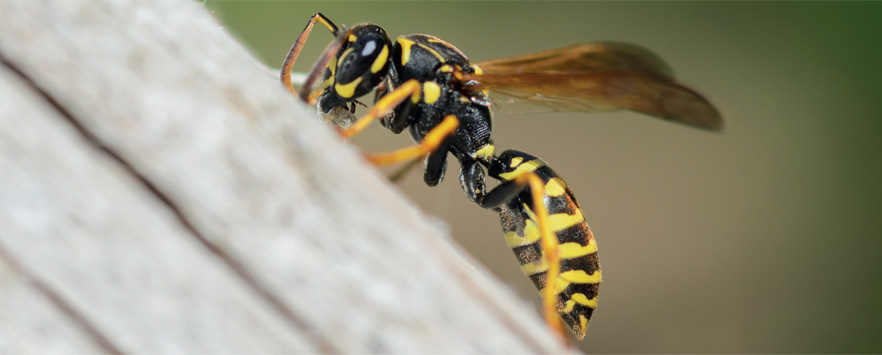Wasp Nest Removal, Norwich, Norfolk
Lady Mole Catcher is also qualified to deal with wasp and hornet nests. As a professional wildlife management specialist, she has the knowledge and skills to arrange for wasp nest removal as well as having access to specific insecticides which are not available to the general public.
About Wasps
Here in the UK, wasps are mainly classed as common wasps (Vespula vulgaris) or German wasps (Vespula germanica). Both are yellow and black striped and are known for their painful stings which can cause allergic and sometimes dangerous reactions. Often seen as an aggressive insect, the wasp will only attack when threatened but it tends to emit a distress pheromone which can make other members of its colony highly defensive and more prone to sting. When wasps are causing problems in a public area or are endangering human health, it may be necessary to prepare for wasp nest removal.
How do you know if you have a wasp nest on your land or property?
If you see a large number of wasps in and around your house, garden or office, there’s probably a wasp nest nearby. Queen wasps emerge from hibernation in the Spring and start working on a new wasp nest, which is made from chewed wood and saliva. She is joined by hundreds of “worker” wasps who continue to build the wasp nest and by the Summer, 300 eggs can be produced daily with up to 5,000 adults feeding grubs and maintaining the wasp nest. Wasps are likely to make their nests in sheltered spots so you’re likely to find them under trees, in bushes, in wall cavities, under eaves or in your shed or garage. They are at their peak in August and September when their work in the wasp nest is done and they start to become a nuisance!
Why control wasps?
There are a few issues to consider if you discover a wasp nest:
- Wasp stings are painful and can be fatal. For people who are allergic to wasp stings, anaphylactic shock can occur and this is a life-threatening reaction
- If you run a business and customers are bombarded by wasps they are likely to complain or even worse, stop visiting you
- You have a duty to protect your customers and staff as well as minimising the disruption to your business
- Wasps should only be treated if they pose a risk to public health and safety
- The earlier you treat a wasp nest, the less aggressive the colony is going to be
- Wasps do not die after one sting – they can sting you multiple times! Remember that when they feel threatened, wasps can become aggressive very quickly…

Louise Chapman BA (Hons) PGCE
Norfolk’s very own Lady Mole Catcher®
Who I work with
- Householders in their gardens
- Farmers and Land Agents
- Outdoor Leisure Facilities
- Businesses
- Restaurants and Pubs
- Schools/Colleges
- Local Authorities
If wasps or hornets are causing problems in your area, get in touch with Louise to arrange for a site survey or consultation. Call 01603 25 99 45 or 07876 14 11 53 or email louise@ladymolecatcher.co.uk
Hornet Nests
Although less common in the UK, the European hornet (Vespa crabro) can be twice the size of the common wasp (25 to 35mm) and is brown and yellow in colour. As Britain’s largest social wasp, the hornet queen begins to build a nest in spring and lays eggs within the paper cells. Once her new ‘workers’ emerge, they take over the care of the nest which reaches its peak size towards mid September.
Despite its fearsome reputation, the hornet is rarely aggressive unless the colony is threatened. However, they can bite and sting at the same time and also mobilise their whole colony to sting an intruder, which can cause a danger to humans. Especially as a hornet colony can grow to up to 700 workers…
Hornet nests can be found in trees, bushes, buildings, barns, attics and walls. Their nests resemble upside down buckets and are often the size of a football. The debris that’s formed from a large hornet’s nest can create a large amount of waste which can cause structural (and expensive) damage to walls and ceilings.
Hornets will sting if they are disturbed so if they are likely to come into contact with you, your family, pets or employees, you may need to have the hornet nest removed. This is a serious consideration if anyone nearby has an allergy to hornet or wasp stings as they are not only painful but can also be life threatening.

